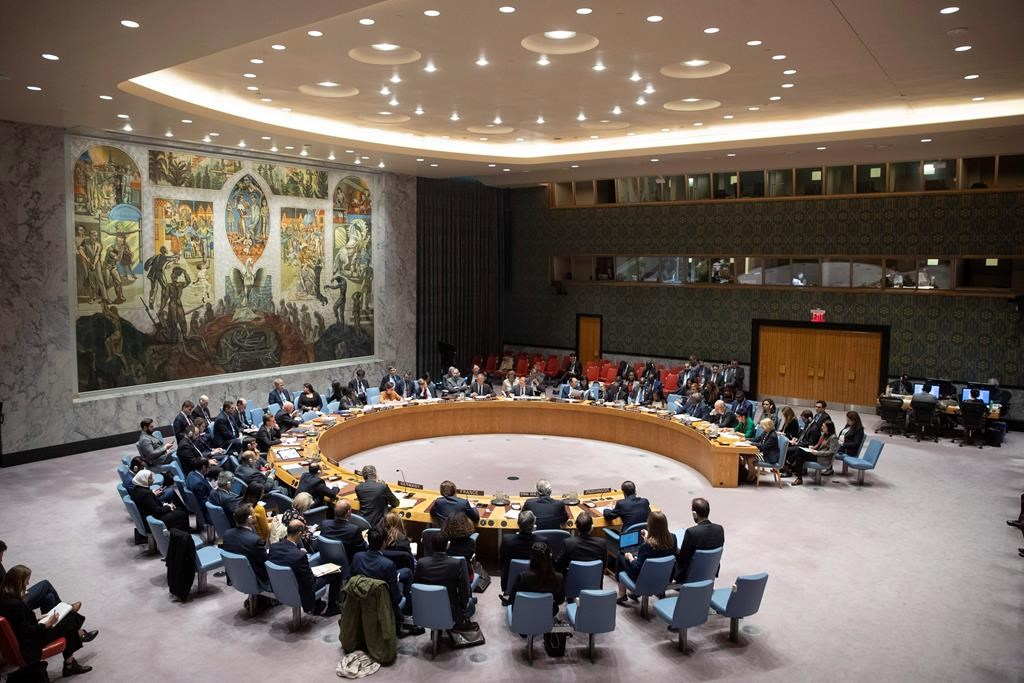Support strong Canadian climate journalism for 2025
Today could be decision day for what could be Prime Minister Justin Trudeau's biggest foreign policy gambit: Canada's bid for a temporary seat on the United Nations Security Council.
The voting begins at 9 a.m. eastern time, with the 193 UN ambassadors gaining staggered access to the General Assembly meeting hall to prevent the spread of COVID-19.
Foreign Affairs Minister Francois-Philippe Champagne, who travelled by car to New York City on the weekend, will cast Canada's vote around mid-day.
Canada is competing against Norway and Ireland for two seats, and the competition is expected to be heated.
The historic promenade of electors is set to take at least five hours — it would have taken about one in a full pre-pandemic chamber — and it could all be repeated Thursday if two of the competing countries can't get 129 votes, or two-thirds of the assembly.
European countries are expected to unite around Canada's two competitors, which has forced the Trudeau government to focus on Africa, Latin America, and Arab nations, as well as the small island states of the South Pacific that face potential extinction one day from rising sea levels caused by climate change.
"This is a big moment for Canada. In my job, I want Canada to inspire the world by its values and its principles," Champagne said in an interview.
"I see that as being meaningful and I know in my discussions with foreign ministers around the world, and people with whom we've been engaging in Africa, the Caribbean, the Pacific islands, a number of them really rely on Canada to be part of building back better — the great reset."
Trudeau declared his intention to compete for the Security Council in 2015, following Canada's humbling failure five years earlier when tiny Portugal managed to win more support.
Canada's campaign for the council rests on what it has been doing to help fight the pandemic. That has included convening like-minded countries to ensure food security in developing countries, keeping vital supply chains open across the globe, and working on new financing models to help struggling countries whose economies have been decimated by the pandemic.
"We're facing good competition. But I hear from people is that Canada, especially in the COVID time, is bringing positive and progressive leadership," said Champagne.
Independent Sen. Peter Boehm, who was Canada's ambassador to Germany in 2010 when the European powerhouse won a seat alongside Portugal, returned to the 2020 campaign to lobby small island states on Canada's behalf.
Like many others, Boehm questioned whether Canada belongs in the Western European and Others Group, or WEOG, the UN geographical bloc that Canada has been assigned.
"WEOG is sort of a lonely place for Canada, Australia, New Zealand, Israel. We don't really fit," said Boehm.
He said Canada belongs in the Group of Latin American and Caribbean Countries, which is less competitive and makes more geographic sense for Canada.
Boehm and many others believe it will take more than one round for the two winners to emerge, which would mean a second full day of voting on Thursday.
Tijjani Muhammad-Bande, the Nigerian diplomat and scholar who is the current president of the General Assembly, has overseen a painstaking negotiation that resulted in all 193 UN missions agreeing to the new COVID-19 format of staggered voting.
"We have undertaken that within 24 hours after the election, when it's known we need a second round, we'll start the process. The secretariat has worked very, very hard to plan should that be the case."
Champagne said if a second round is needed he will be making calls and sending text messages, to swing support. And so will Canadian diplomats who he said have a game plan for all scenarios.
"This is Team Canada playing. We'll be there with everything we've got."
This report by The Canadian Press was first published June 17, 2020.





Comments